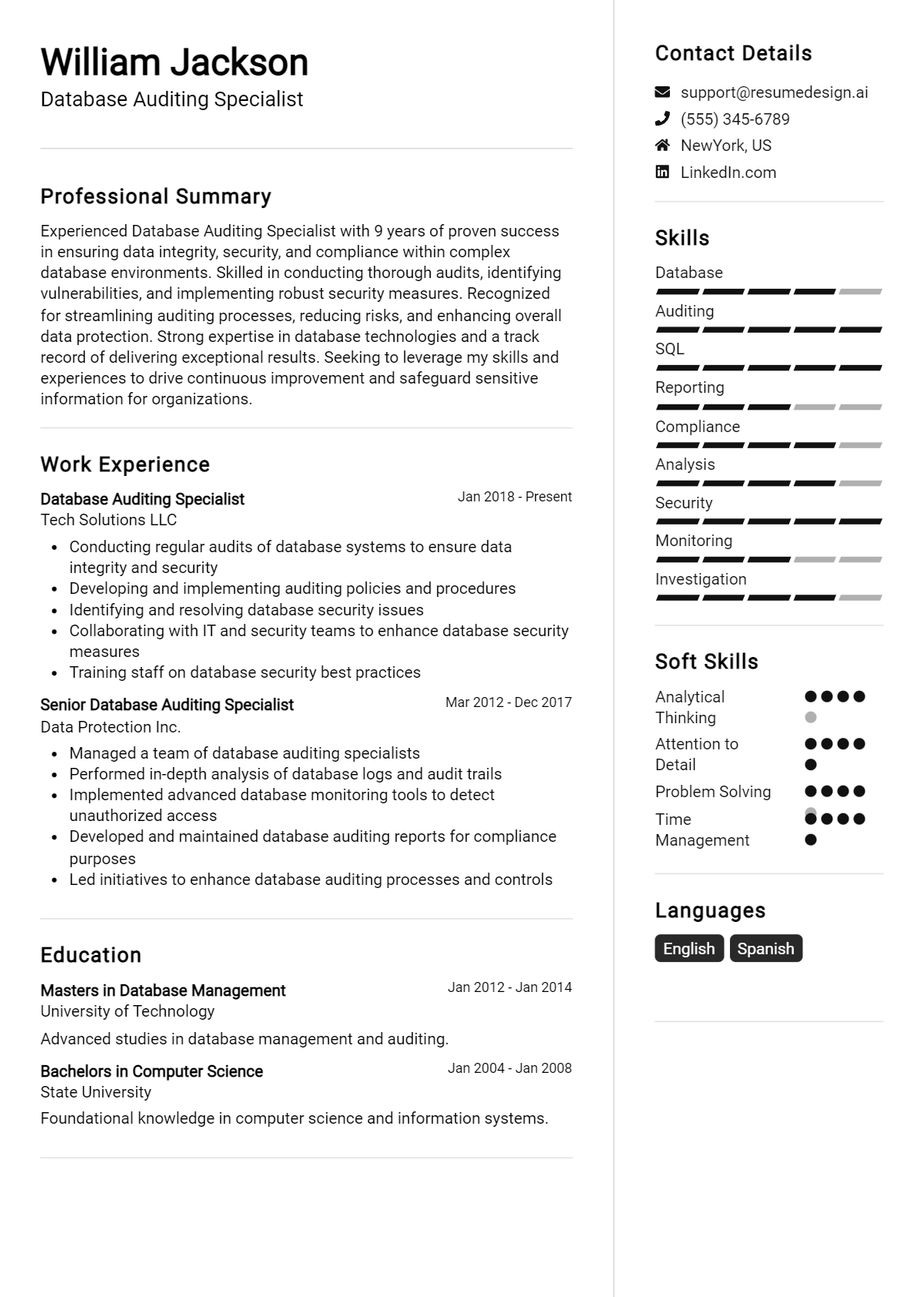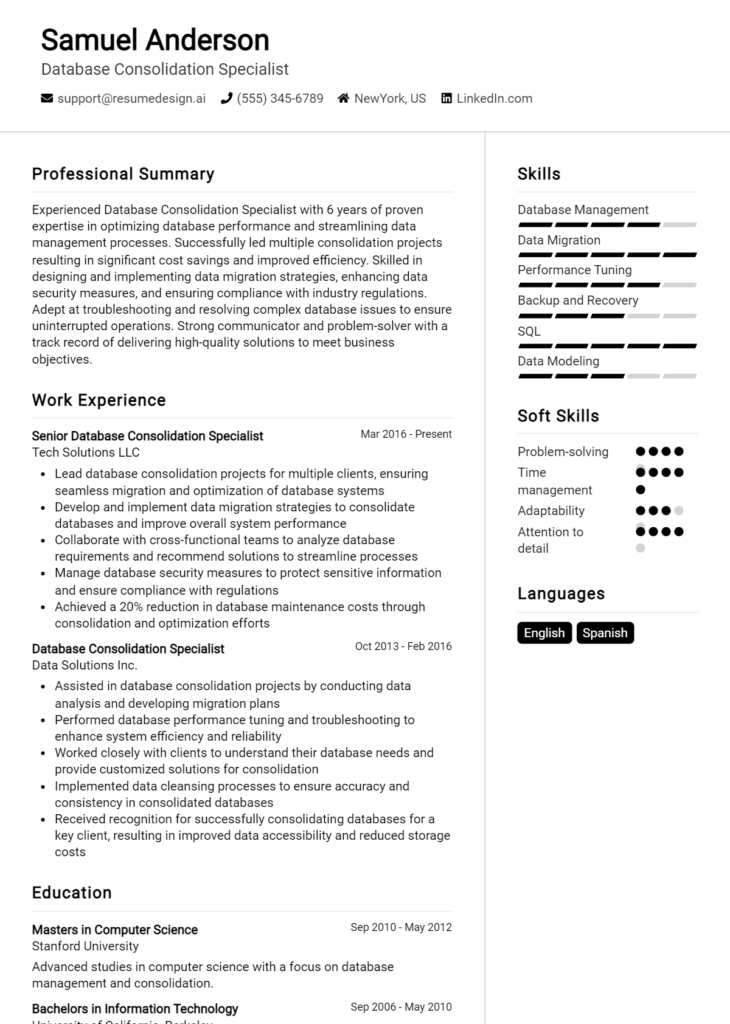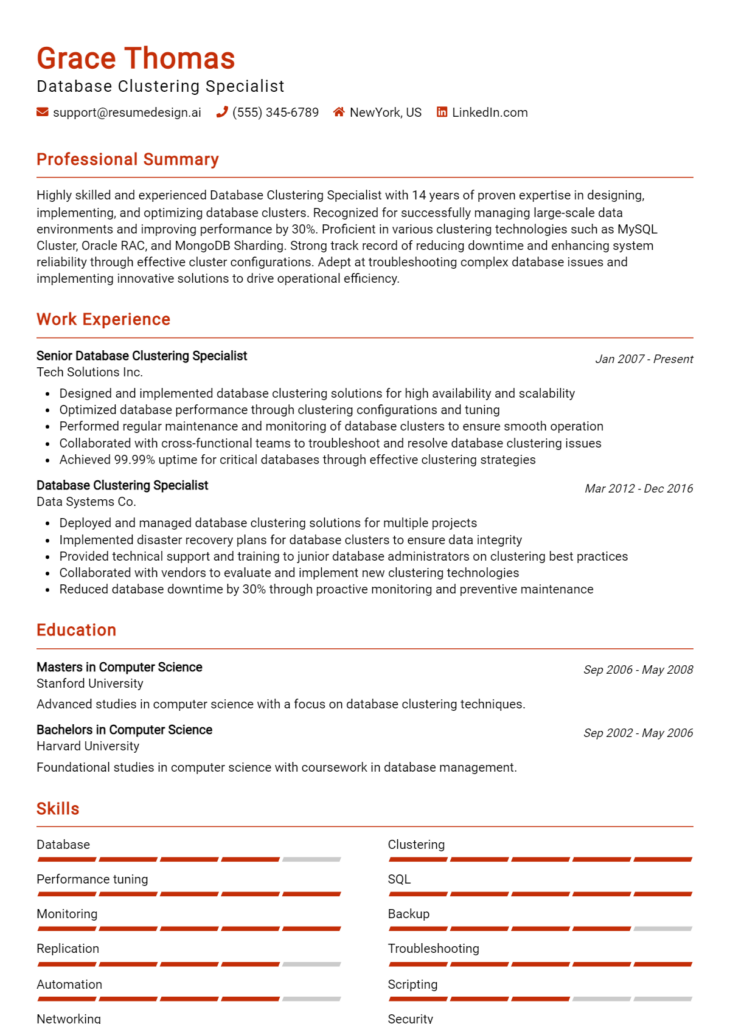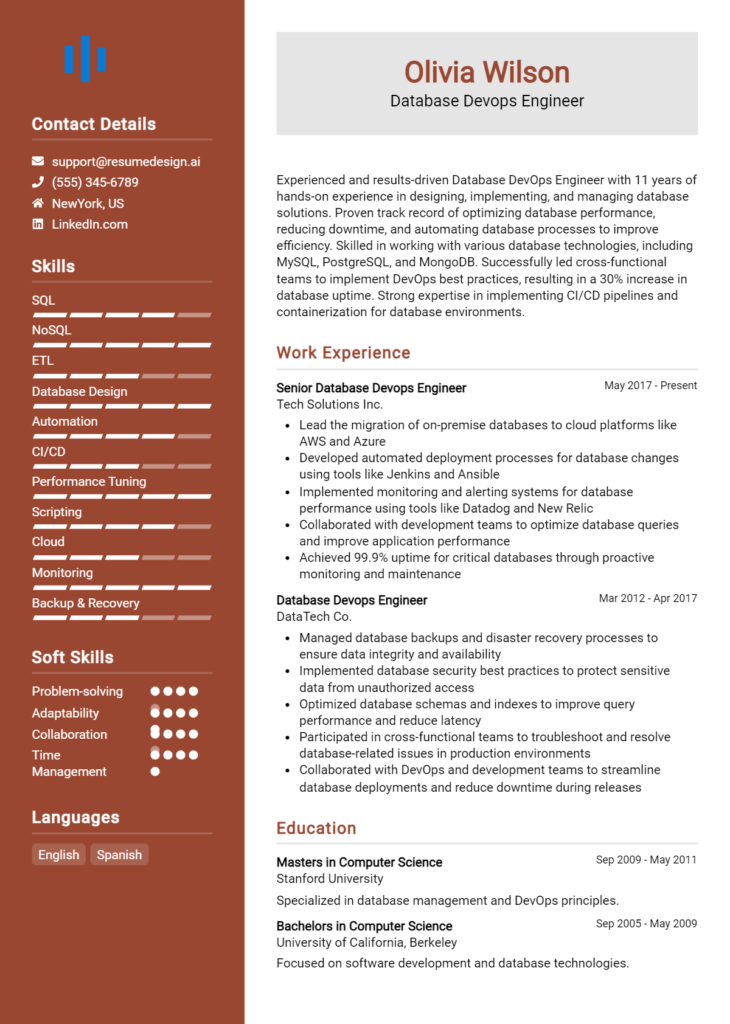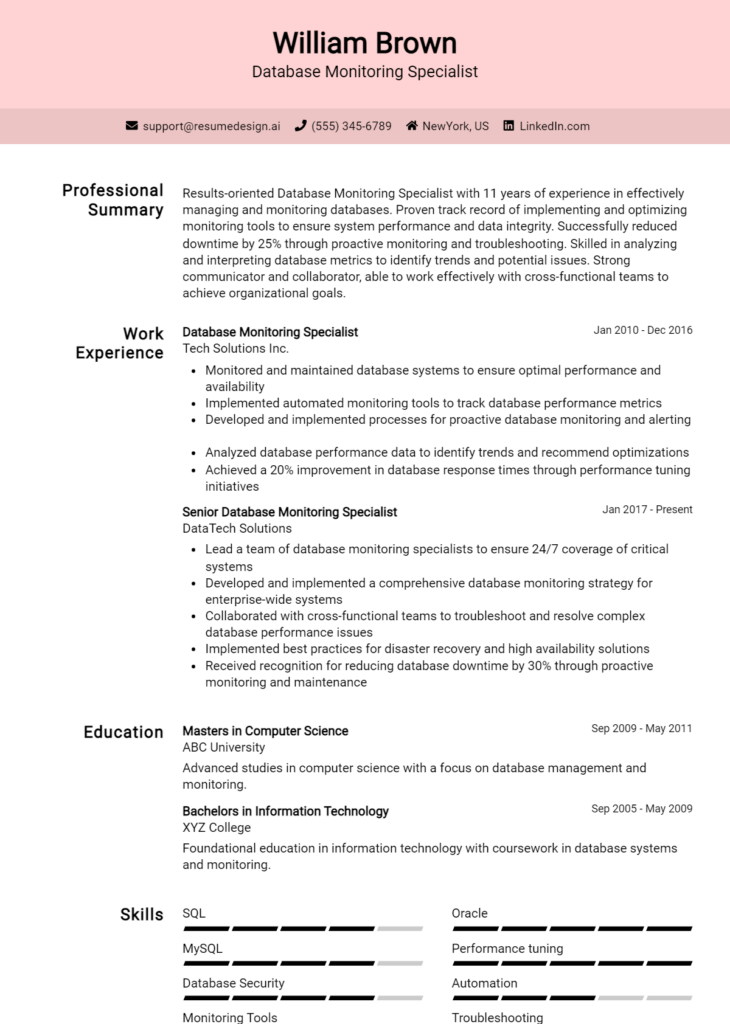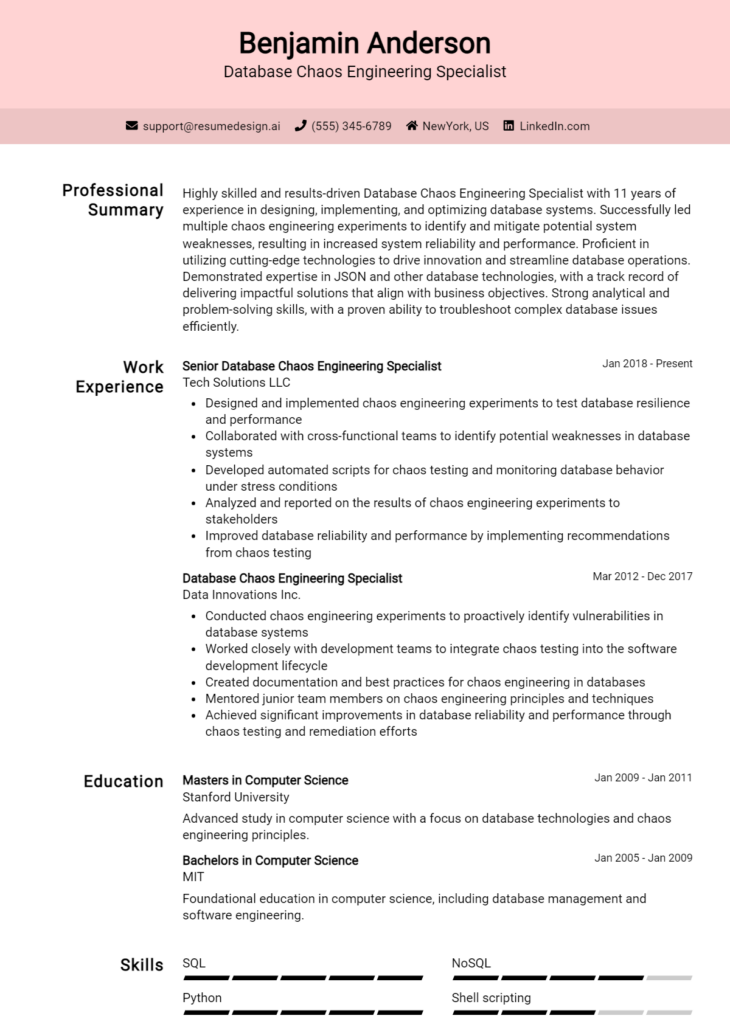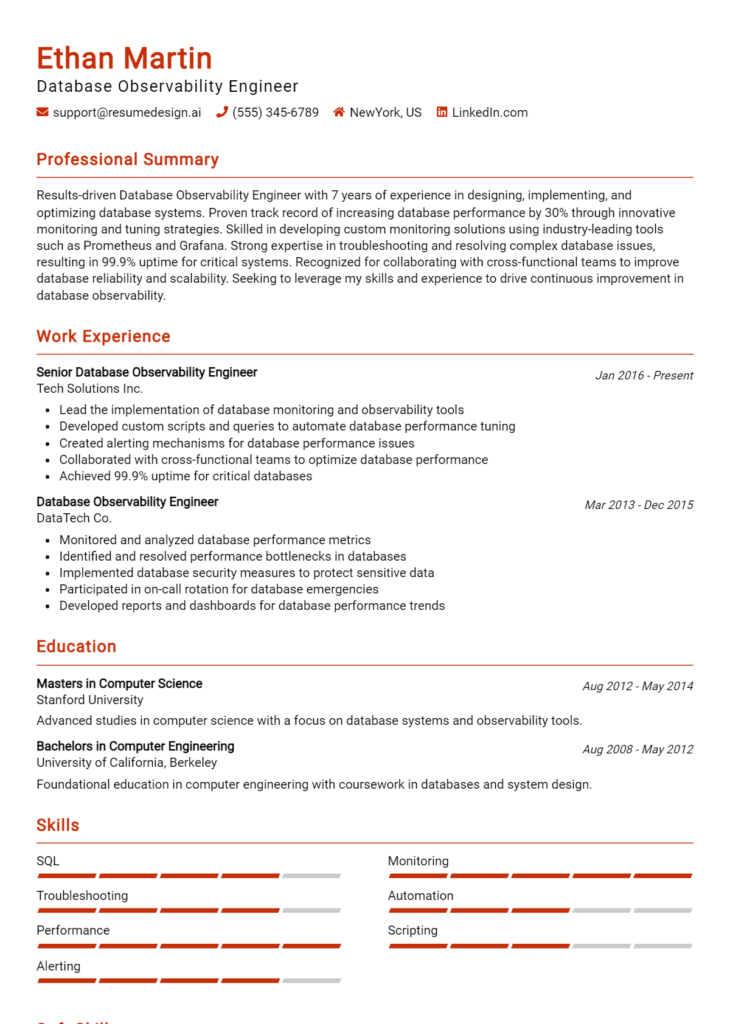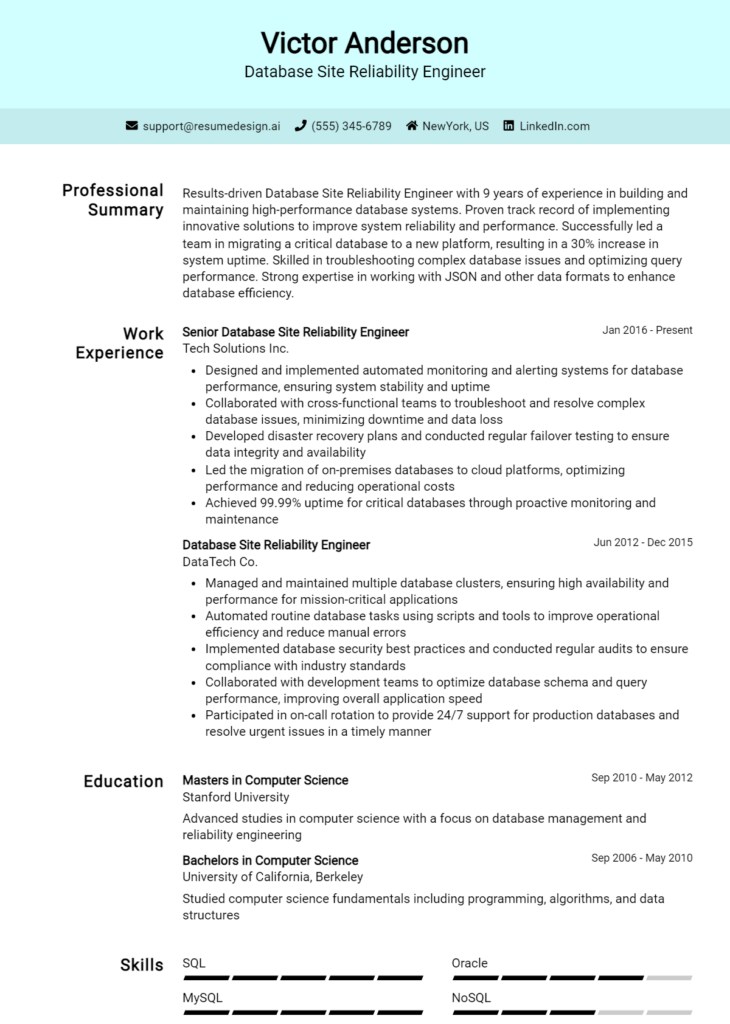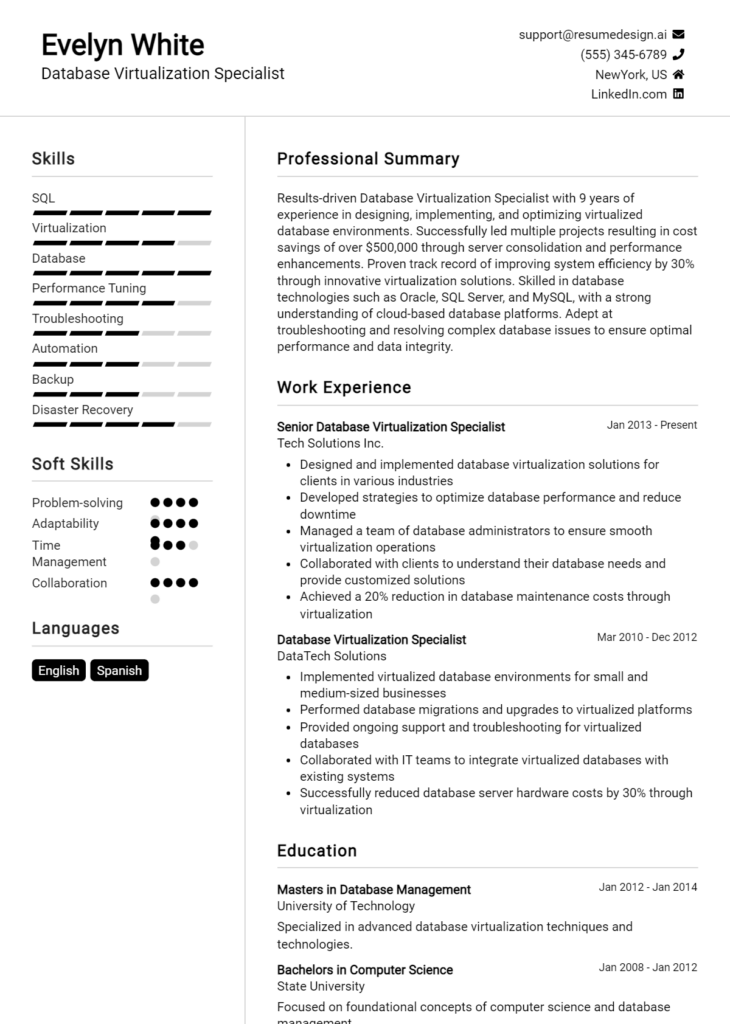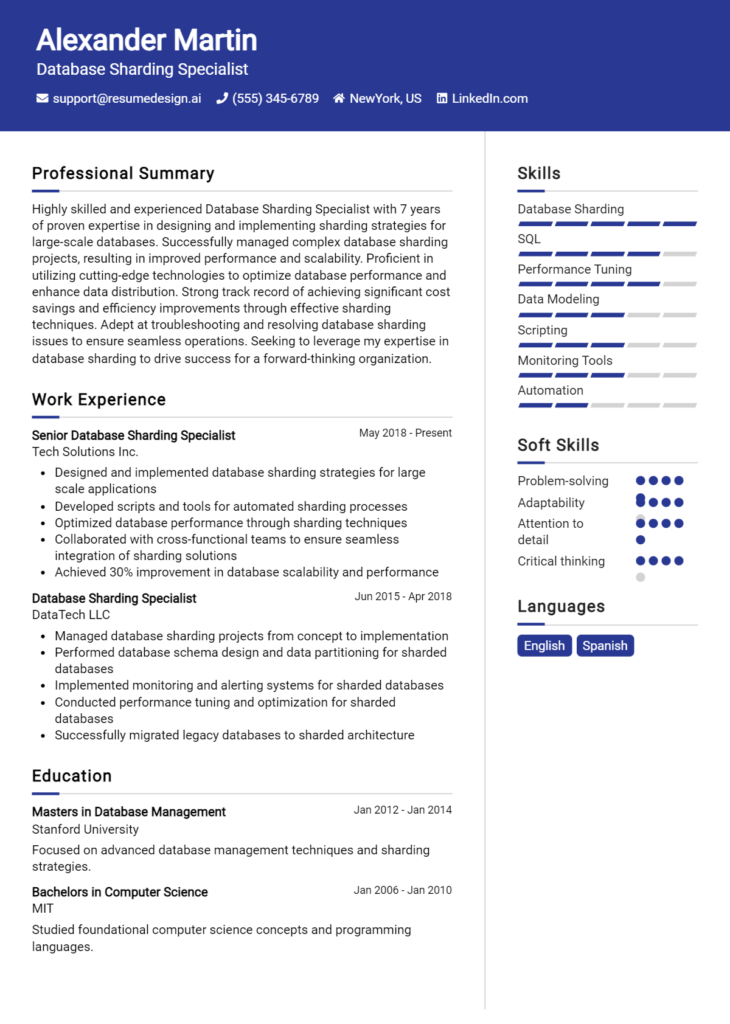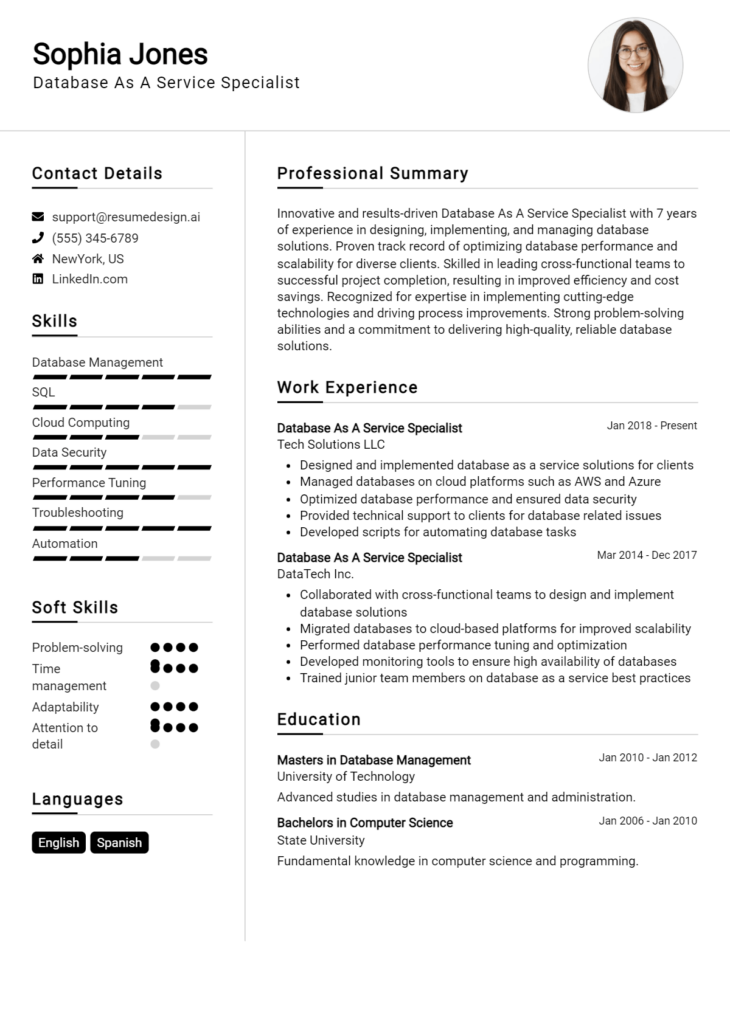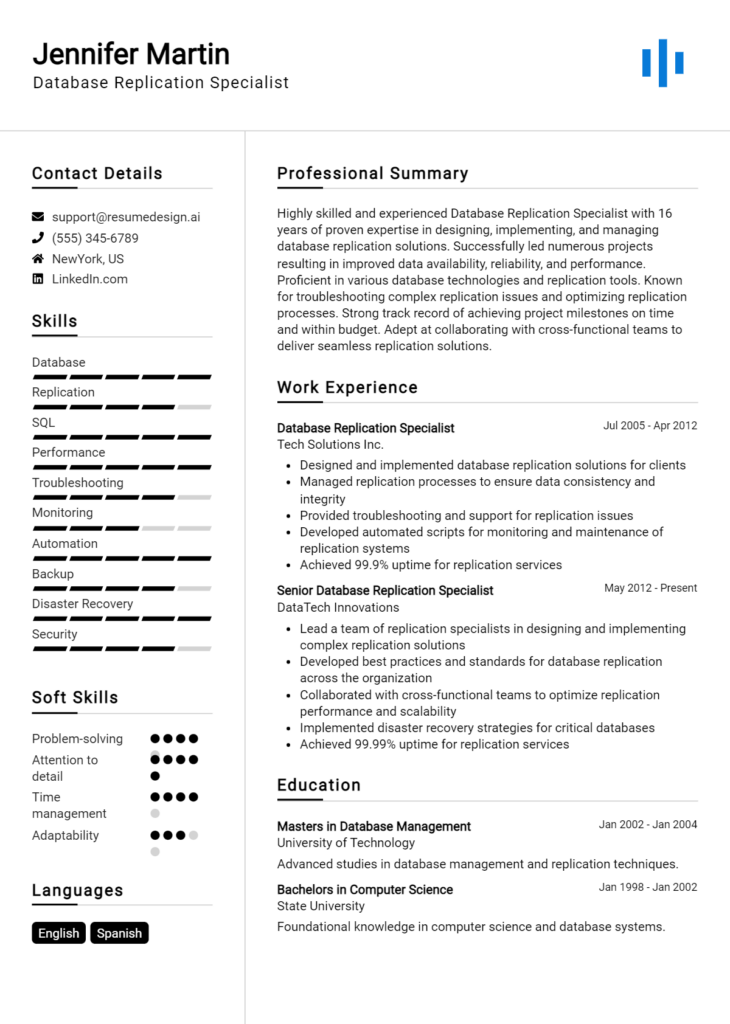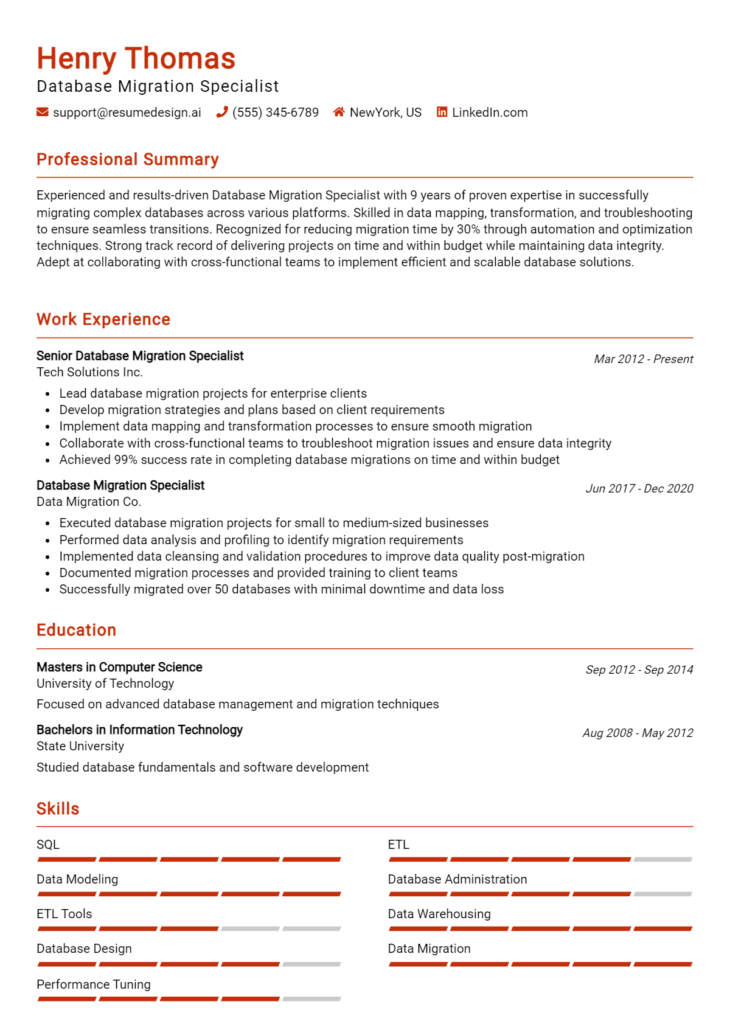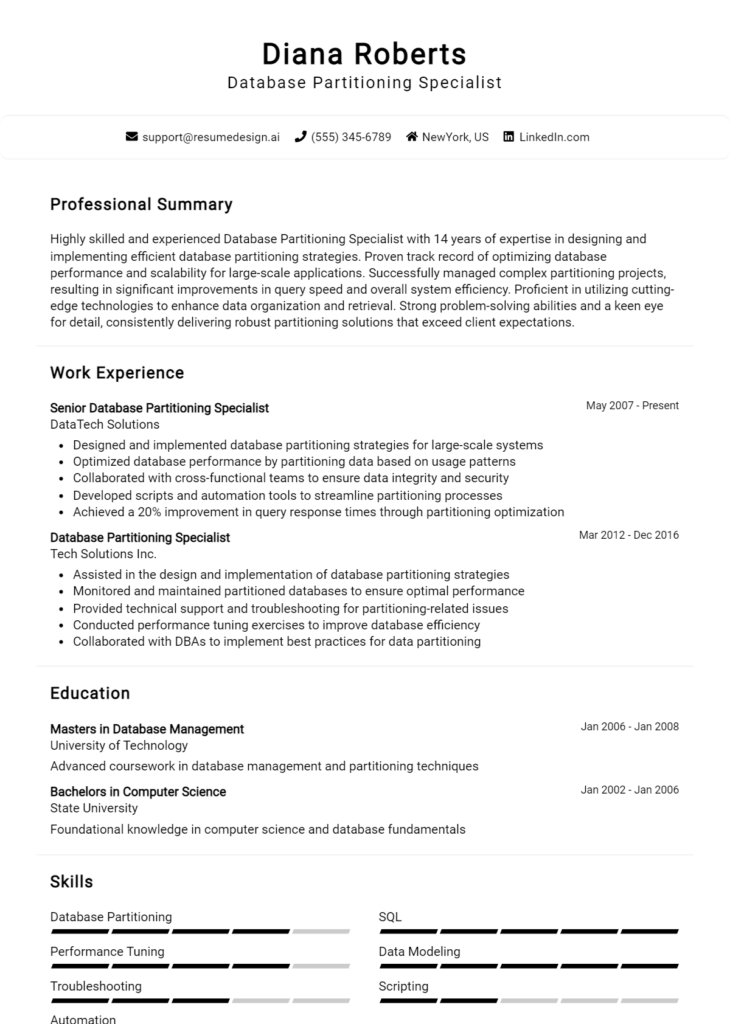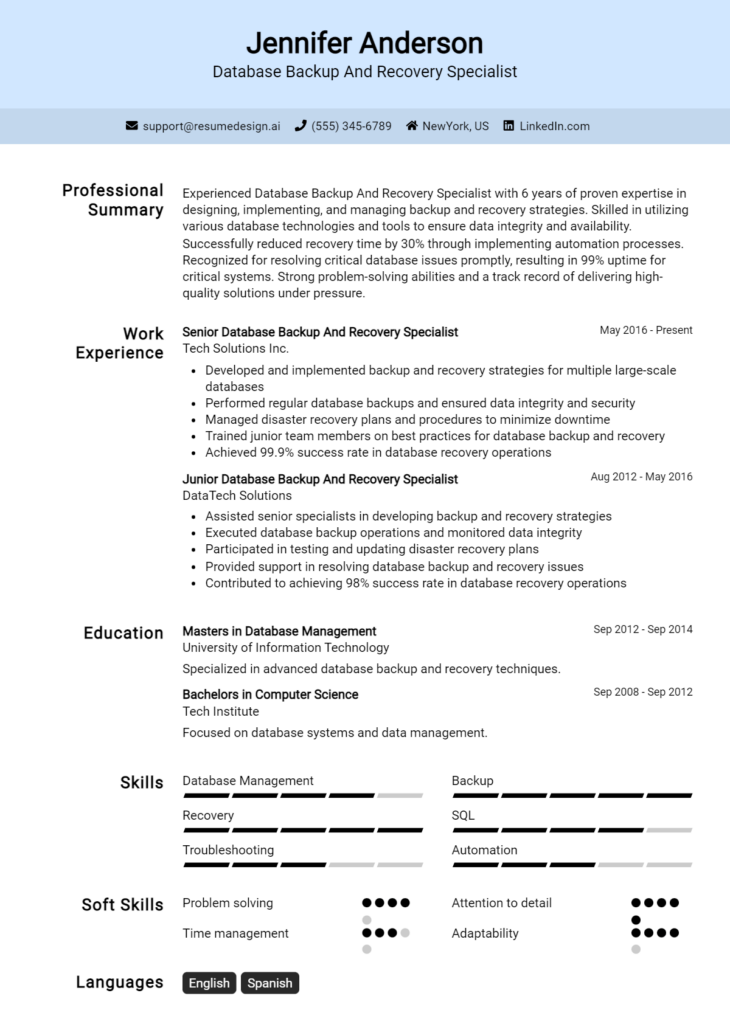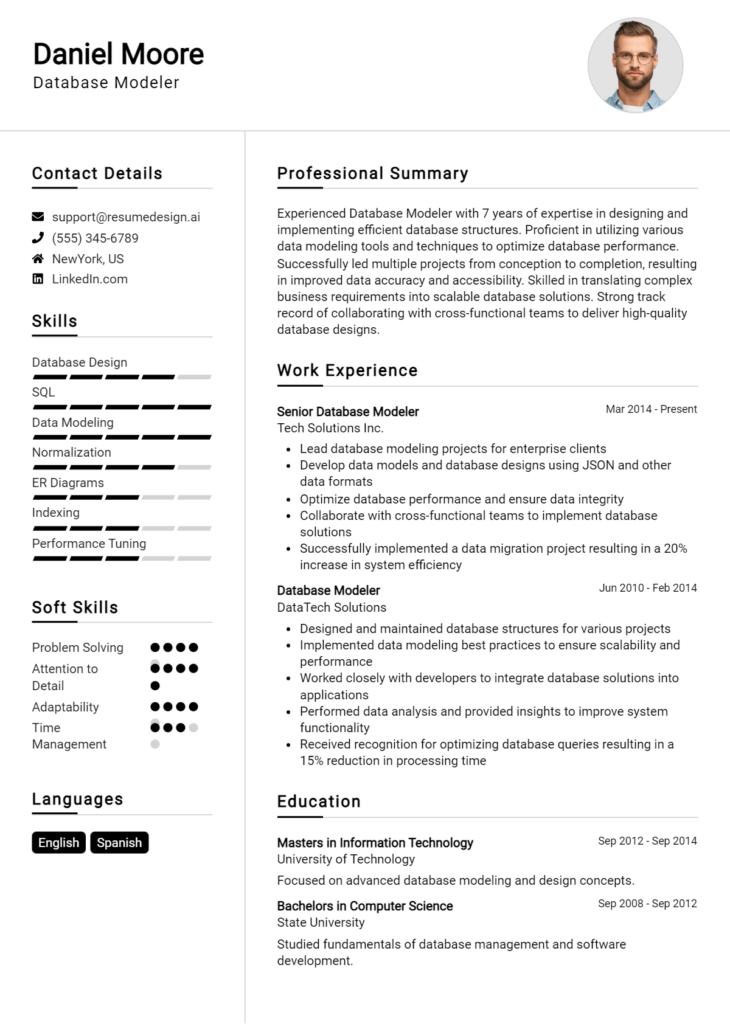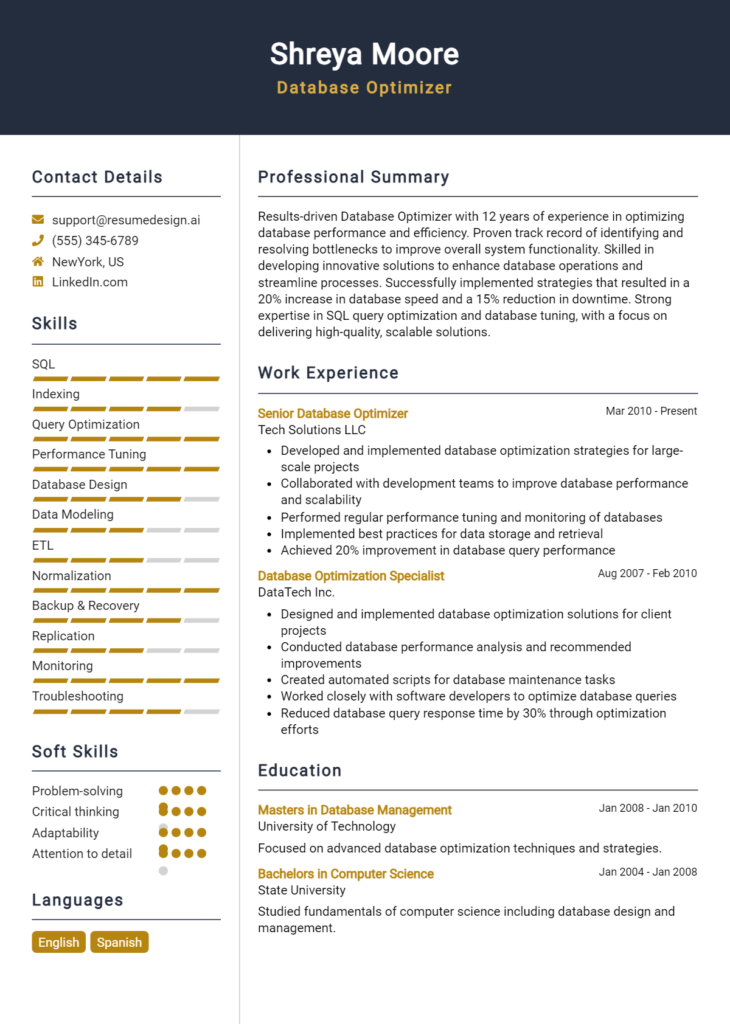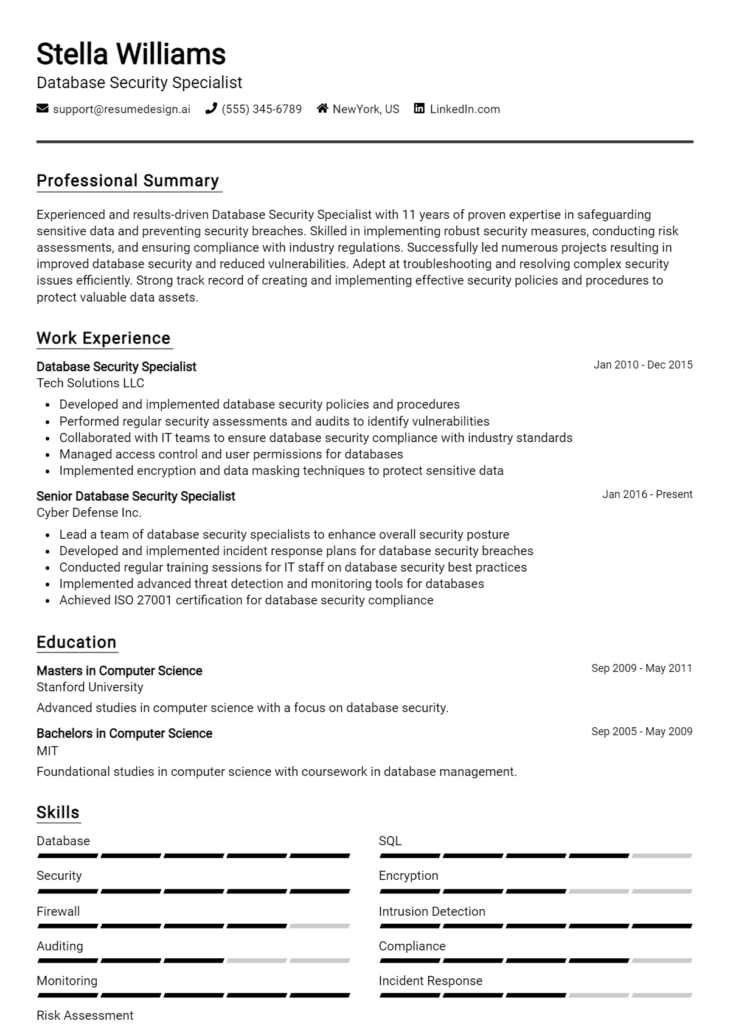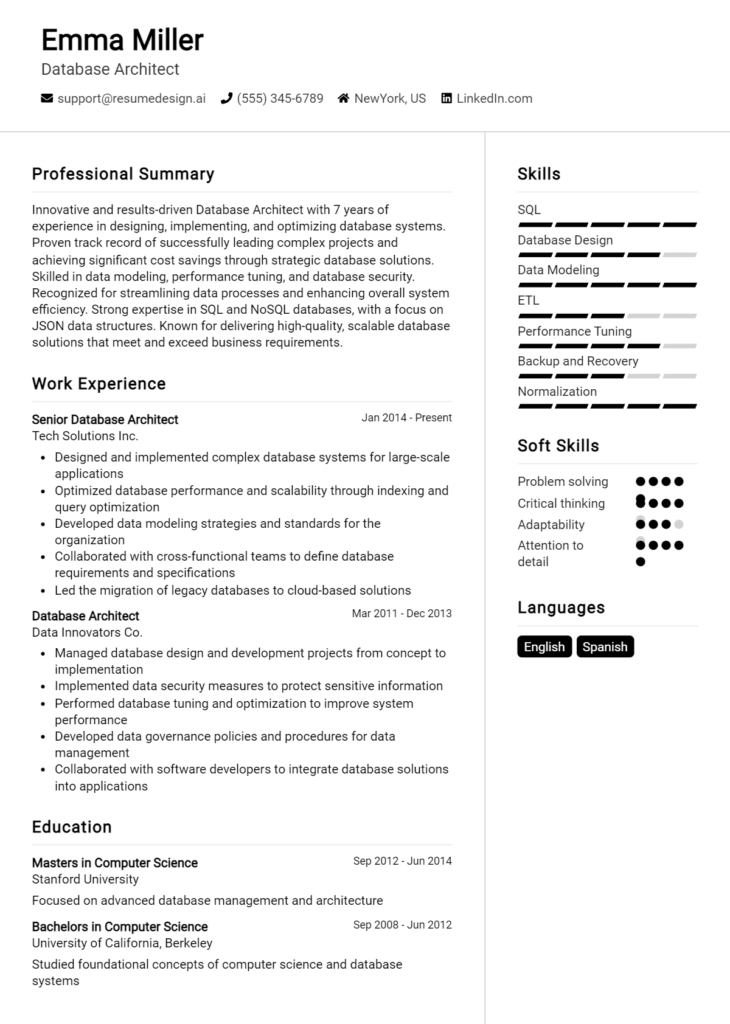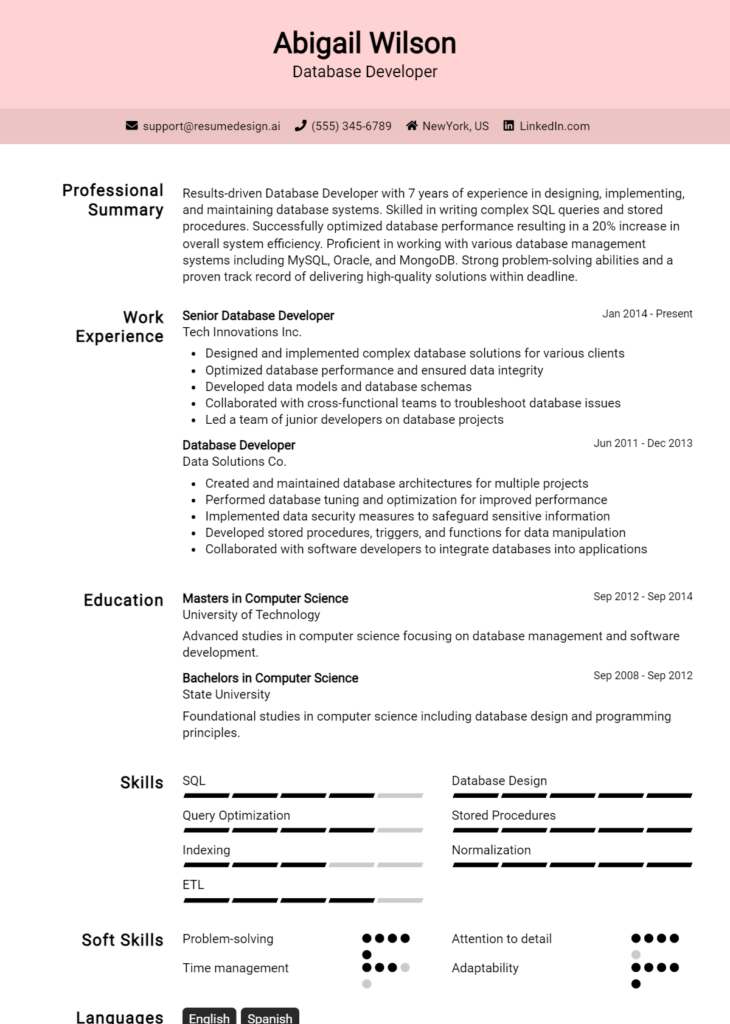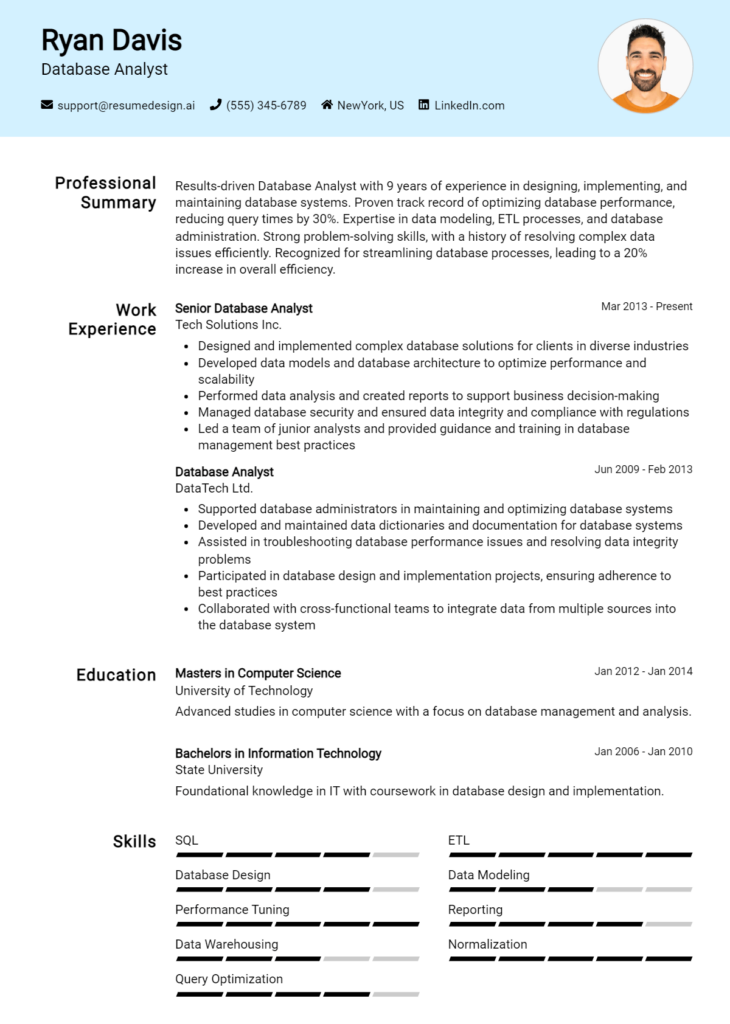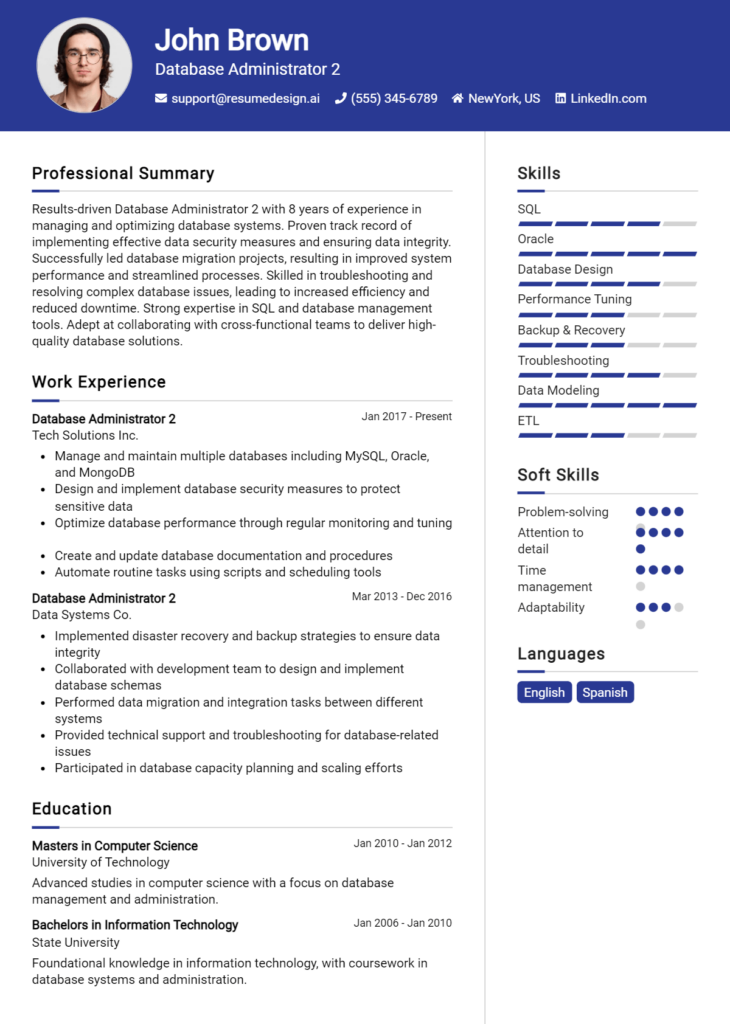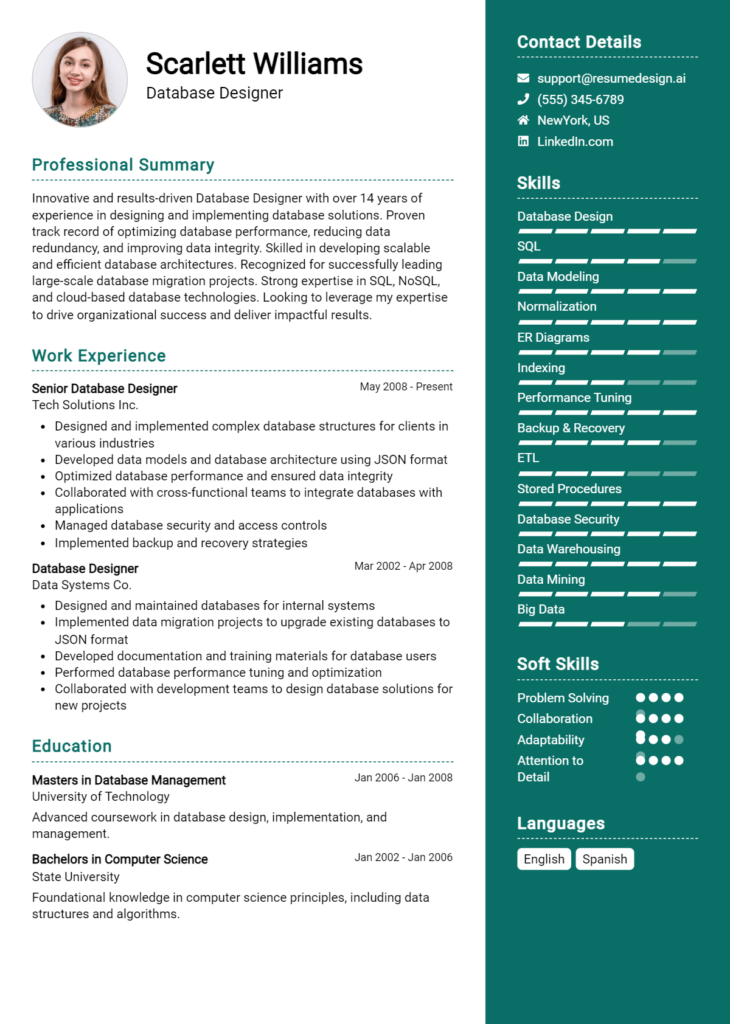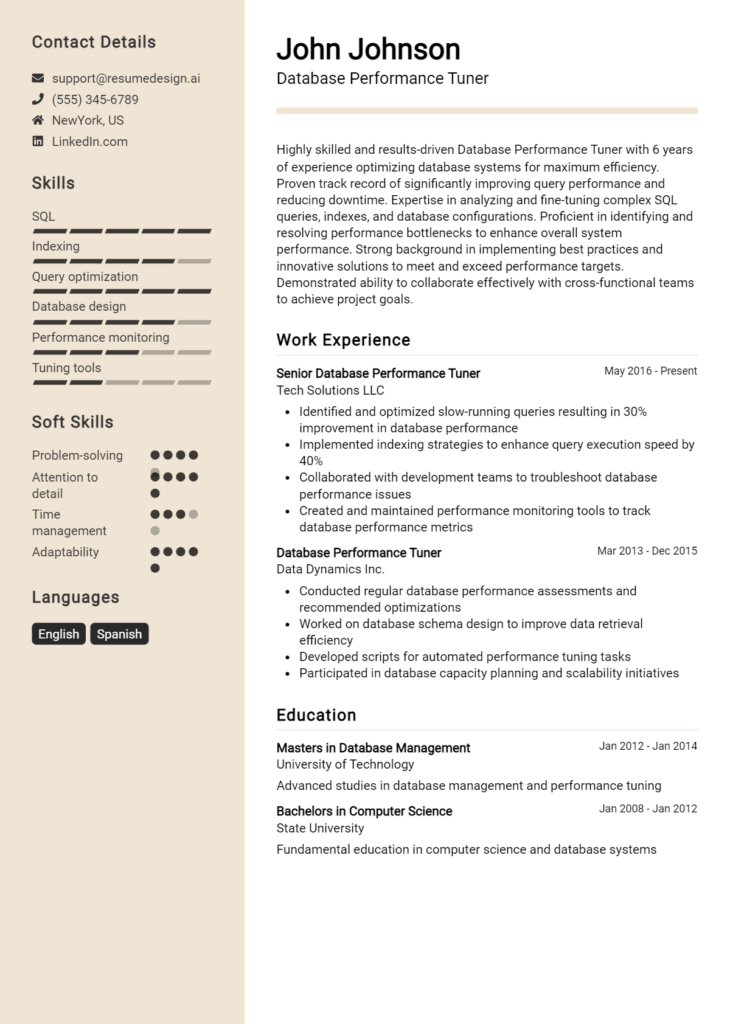Database Auditing Specialist Core Responsibilities
A Database Auditing Specialist is pivotal in ensuring data integrity and compliance across various departments. Key responsibilities include conducting detailed audits, analyzing database systems for vulnerabilities, and implementing policies for data governance. Successful professionals must possess strong technical skills in database management, operational understanding of data flows, and exceptional problem-solving abilities. These skills are crucial for aligning departmental objectives with organizational goals. A well-structured resume highlighting these qualifications can significantly enhance career opportunities.
Common Responsibilities Listed on Database Auditing Specialist Resume
- Conducting regular audits of database systems to ensure data integrity.
- Identifying and mitigating security vulnerabilities within databases.
- Developing and implementing data governance policies and procedures.
- Collaborating with IT and compliance teams to align database practices.
- Analyzing audit findings and preparing detailed reports for stakeholders.
- Monitoring database performance and recommending improvements.
- Ensuring compliance with industry regulations and standards.
- Providing training and support to staff on data management best practices.
- Performing data quality assessments to enhance accuracy.
- Utilizing data analytics tools to identify trends and anomalies.
- Maintaining documentation of audit processes and findings.
High-Level Resume Tips for Database Auditing Specialist Professionals
In today's competitive job market, a well-crafted resume serves as a crucial stepping stone for Database Auditing Specialist professionals seeking to make their mark. Since your resume is often the first impression you make on a potential employer, it is essential that it effectively captures both your skills and achievements. A strong resume not only highlights your technical expertise in database auditing but also demonstrates your ability to add value to an organization. This guide will provide practical and actionable resume tips specifically tailored for Database Auditing Specialist professionals, ensuring that your application stands out in the crowd.
Top Resume Tips for Database Auditing Specialist Professionals
- Tailor your resume to the job description by incorporating relevant keywords and phrases that match the position's requirements.
- Showcase your relevant experience by focusing on past roles that involved database management, auditing practices, and compliance measures.
- Quantify your achievements to demonstrate your impact, such as the percentage of data accuracy improved or the amount of time saved through your auditing processes.
- Highlight industry-specific skills such as knowledge of SQL, data governance, risk management, and familiarity with auditing tools.
- Include certifications related to database auditing or IT governance, such as Certified Information Systems Auditor (CISA) or Certified Information Security Manager (CISM).
- Utilize a clear and professional format, ensuring that your resume is easy to read and visually appealing to grab the attention of hiring managers.
- Incorporate a summary statement at the beginning of your resume that succinctly outlines your experience and what you bring to the table.
- Emphasize your analytical skills and attention to detail, as these are critical traits for success in database auditing.
- Consider including a section for professional development to showcase any relevant workshops, courses, or conferences you have attended.
By implementing these tips, you can significantly increase your chances of landing a job in the Database Auditing Specialist field. A focused and well-structured resume not only highlights your qualifications but also conveys your professionalism and readiness to contribute to an organization's success. Make your resume a powerful tool to unlock new career opportunities in this dynamic industry.
Why Resume Headlines & Titles are Important for Database Auditing Specialist
In the competitive landscape of database auditing, a well-crafted resume headline or title plays a pivotal role in capturing the attention of hiring managers. For a Database Auditing Specialist, this headline serves as the first impression and can succinctly summarize the candidate's key qualifications and expertise in a single impactful phrase. A strong headline not only highlights the relevant skills and experience but also aligns directly with the job being applied for. It should be concise and relevant, providing a clear snapshot of the candidate's capabilities and setting the stage for the remainder of the resume.
Best Practices for Crafting Resume Headlines for Database Auditing Specialist
- Keep it concise: Aim for one impactful phrase that summarizes your expertise.
- Be specific: Use keywords and terms relevant to database auditing roles.
- Highlight key skills: Focus on the most pertinent skills that align with the job description.
- Use action-oriented language: Start with strong verbs to convey your contributions.
- Avoid clichés: Stay away from generic phrases that do not add value.
- Tailor for the role: Customize the headline for each application to reflect the specific job requirements.
- Showcase achievements: If possible, incorporate quantifiable results or accomplishments.
- Maintain professionalism: Ensure the tone is suitable for the industry and position.
Example Resume Headlines for Database Auditing Specialist
Strong Resume Headlines
Detail-Oriented Database Auditing Specialist with 5+ Years of Experience in Compliance and Risk Management
Certified Database Auditor Skilled in SQL, Data Integrity, and Regulatory Compliance
Results-Driven Database Auditing Expert with Proven Track Record in Enhancing Data Security
Experienced Database Auditor Specializing in Risk Assessment and Mitigation Strategies
Weak Resume Headlines
Database Specialist Looking for a Job
Experienced Professional in Databases
The strong resume headlines effectively convey the candidate's specific skills, experience, and areas of expertise, making them immediately relevant to hiring managers. They incorporate industry-specific terminology and highlight quantifiable achievements or certifications, which can set a candidate apart from the competition. On the other hand, the weak headlines lack specificity and do not communicate any unique qualifications or strengths, rendering them forgettable and less impressive in a crowded job market. This distinction underscores the importance of crafting a compelling headline that truly represents the value a candidate brings to the table.
Writing an Exceptional Database Auditing Specialist Resume Summary
A well-crafted resume summary is essential for a Database Auditing Specialist as it serves as the first impression for hiring managers. This brief but impactful paragraph encapsulates the candidate's key skills, relevant experience, and notable accomplishments in the field of database auditing. A strong summary quickly captures attention and establishes the candidate's credibility, making it easier for hiring managers to see the value they can bring to the organization. To maximize effectiveness, the summary should be concise and tailored to align with the specific requirements of the job being applied for, ensuring that it resonates with the hiring team.
Best Practices for Writing a Database Auditing Specialist Resume Summary
- Quantify achievements: Use numbers to demonstrate your impact, such as the percentage of database errors reduced or the number of audits completed.
- Focus on relevant skills: Highlight specific skills that are critical for the role, such as SQL proficiency, compliance knowledge, or data integrity expertise.
- Tailor the summary: Customize your summary for each job application by incorporating keywords and phrases from the job description.
- Keep it concise: Aim for 2-4 sentences that deliver a powerful message without overwhelming the reader.
- Highlight certifications: Mention any relevant certifications, such as CISA or CISSP, to showcase your qualifications.
- Use strong action verbs: Start sentences with dynamic verbs to convey your abilities and achievements effectively.
- Showcase industry knowledge: Include any specific knowledge of industry regulations or standards that pertain to database auditing.
- Emphasize results-driven mindset: Focus on outcomes and how your work has positively impacted previous employers.
Example Database Auditing Specialist Resume Summaries
Strong Resume Summaries
Results-oriented Database Auditing Specialist with over 5 years of experience in enhancing data integrity and compliance. Successfully reduced database errors by 30% through meticulous auditing processes and implementation of robust data governance strategies.
Detail-focused Database Auditing Specialist adept at conducting comprehensive audits and ensuring adherence to regulatory standards. Achieved a 95% compliance rate in annual audits, resulting in significant cost savings and risk mitigation for previous employers.
Skilled Database Auditing Specialist with a proven track record in identifying and rectifying data discrepancies. Leveraged advanced SQL techniques to streamline audit processes, leading to a 40% reduction in audit turnaround time.
Weak Resume Summaries
Experienced database auditor looking for a new opportunity. I have worked in various roles and have some skills in data management.
Database auditing professional with experience in auditing databases and ensuring data quality. I am seeking a position where I can apply my skills.
The examples highlighted demonstrate a clear distinction between strong and weak resume summaries. Strong summaries are specific, quantifiable, and directly relate to the role of a Database Auditing Specialist, illustrating the candidate's impact and expertise. In contrast, weak summaries lack detail, fail to showcase concrete achievements, and come across as generic, making it difficult for hiring managers to gauge the candidate's true capabilities.
Work Experience Section for Database Auditing Specialist Resume
The work experience section of a Database Auditing Specialist resume is critical as it serves as a platform to demonstrate a candidate's technical skills, leadership abilities, and commitment to delivering high-quality database solutions. This section allows applicants to present their hands-on experience with database management systems, auditing tools, and compliance standards, thereby showcasing their expertise in maintaining data integrity and security. By quantifying achievements, such as the percentage of discrepancies identified and rectified or the number of successful audits completed, candidates can effectively align their experience with industry standards, making a compelling case for their suitability for the role.
Best Practices for Database Auditing Specialist Work Experience
- Clearly articulate technical skills related to database auditing and compliance.
- Quantify achievements to demonstrate the impact of your contributions (e.g., reduced data errors by 30%).
- Use industry-standard terminology to align your experience with the job requirements.
- Highlight leadership roles or team collaborations to showcase your ability to manage projects effectively.
- Include specific tools and technologies you have used to perform audits (e.g., SQL, Oracle, auditing software).
- Demonstrate a proactive approach to identifying and mitigating risks within database systems.
- Tailor your work experience to the job description, emphasizing relevant experiences.
- Maintain a chronological structure to provide a clear career progression narrative.
Example Work Experiences for Database Auditing Specialist
Strong Experiences
- Led a team of 5 auditors to conduct comprehensive database audits, resulting in a 40% reduction in compliance violations over a 12-month period.
- Implemented a new auditing protocol that improved the detection of data discrepancies by 50%, enhancing overall data integrity.
- Collaborated with cross-functional teams to develop and execute an enterprise-wide data governance strategy, successfully aligning practices with industry standards.
- Utilized advanced SQL queries to identify and resolve over 200 critical data issues, improving reporting accuracy and reliability.
Weak Experiences
- Worked on database audits and ensured compliance with regulations.
- Assisted in data management tasks with little detail on outcomes.
- Participated in team meetings and shared ideas regarding database issues.
- Helped with various auditing processes but did not specify contributions or results.
The examples listed as "strong experiences" are considered effective because they provide specific details regarding the candidate's contributions and quantifiable results, which illustrate their impact on previous employers. In contrast, the "weak experiences" lack clarity and measurable outcomes, making it difficult to assess the candidate's skills and effectiveness in their role. Strong statements highlight significant achievements and technical leadership, while weak statements come across as vague and unimpressive.
Education and Certifications Section for Database Auditing Specialist Resume
The education and certifications section of a Database Auditing Specialist resume plays a crucial role in establishing the candidate's foundational knowledge and expertise in the field. This section not only showcases the academic background of the applicant but also highlights any industry-relevant certifications and specialized training that demonstrate a commitment to continuous learning and professional development. By providing details about relevant coursework, certifications, and any additional qualifications, candidates can greatly enhance their credibility and alignment with the specific requirements of the job role, making them more appealing to potential employers.
Best Practices for Database Auditing Specialist Education and Certifications
- Include only relevant degrees and certifications that directly relate to database auditing or information security.
- Highlight advanced or industry-recognized certifications, such as Certified Information Systems Auditor (CISA) or Certified Information Systems Security Professional (CISSP).
- Provide specific coursework that pertains to database management, security protocols, and auditing practices.
- Emphasize continuous learning by listing recent workshops, webinars, or training sessions attended.
- Organize the section in reverse chronological order, starting with the most recent qualifications.
- Be concise and avoid unnecessary detail; focus on the most impactful educational experiences.
- Use clear formatting to enhance readability, such as bullet points and distinct categories for degrees and certifications.
- Consider including GPA or honors if they are exceptional and relevant to the role.
Example Education and Certifications for Database Auditing Specialist
Strong Examples
- Bachelor of Science in Information Technology, University of XYZ, 2021
- Certified Information Systems Auditor (CISA), ISACA, 2022
- Coursework: Database Security and Auditing, Advanced SQL, Risk Management
- Certified Information Security Manager (CISM), ISACA, 2023
Weak Examples
- Associate Degree in General Studies, Community College of ABC, 2018
- Certification in Microsoft Word, 2019
- Coursework: Introduction to Business, Basic Computer Skills
- Outdated CompTIA A+ Certification, 2015
The strong examples are considered effective because they directly relate to the skills and knowledge required for a Database Auditing Specialist role, showcasing relevant educational qualifications and recognized certifications that are current and respected in the industry. In contrast, the weak examples lack relevance to database auditing, featuring outdated or unrelated qualifications that do not contribute to the candidate's credibility in this specialized field. By focusing on pertinent education and certifications, candidates can present a compelling case for their suitability for the position.
Top Skills & Keywords for Database Auditing Specialist Resume
A well-crafted resume is crucial for any job application, especially for specialized roles like a Database Auditing Specialist. The right skills can significantly enhance your candidacy by showcasing your expertise and ability to contribute to an organization's data integrity and compliance efforts. Highlighting both hard and soft skills on your resume not only reflects your technical competencies but also demonstrates your ability to work collaboratively, communicate effectively, and adapt to evolving challenges in the field of database auditing. To stand out in a competitive job market, it's essential to ensure that your resume emphasizes these key skills, aligning with the demands of potential employers.
Top Hard & Soft Skills for Database Auditing Specialist
Soft Skills
- Attention to Detail
- Analytical Thinking
- Problem-Solving Skills
- Strong Communication Skills
- Time Management
- Team Collaboration
- Adaptability
- Critical Thinking
- Ethical Judgement
- Conflict Resolution
Hard Skills
- Proficiency in SQL and Database Management Systems (DBMS)
- Familiarity with Audit Tools and Software
- Knowledge of Data Privacy Regulations (e.g., GDPR, HIPAA)
- Risk Assessment and Management
- Data Analysis and Reporting
- Experience with Data Warehousing
- Understanding of Database Security Protocols
- Knowledge of IT Governance Frameworks
- Proficient in Data Migration and Transformation
- Experience with Performance Tuning and Optimization
By incorporating these skills into your resume, you can effectively demonstrate your qualifications for the Database Auditing Specialist role. Additionally, highlighting relevant work experience that showcases your application of these skills will further enhance your profile.
Stand Out with a Winning Database Auditing Specialist Cover Letter
I am writing to express my interest in the Database Auditing Specialist position at [Company Name], as advertised on [where you found the job posting]. With a solid background in database management and a keen eye for detail, I am confident in my ability to contribute effectively to your team while ensuring the integrity and security of your data systems. My experience in conducting thorough audits and implementing best practices aligns well with the requirements of this role.
In my previous position at [Previous Company Name], I successfully led a project to audit and optimize our database systems, which resulted in a 30% reduction in data retrieval times and enhanced overall performance. My expertise in SQL and familiarity with various database management systems, including Oracle and MySQL, have equipped me with the technical skills needed to identify discrepancies and implement corrective measures swiftly. Additionally, I have developed and maintained comprehensive documentation of audit processes, ensuring that all actions taken are transparent and compliant with industry regulations.
I am particularly drawn to [Company Name] because of its commitment to data integrity and innovation in technology solutions. I am excited about the opportunity to leverage my analytical skills and technical knowledge to contribute to your mission of providing reliable and secure database services. I believe that my proactive approach and ability to collaborate with cross-functional teams will make me a valuable asset in your pursuit of excellence in database auditing.
Thank you for considering my application for the Database Auditing Specialist role. I look forward to the possibility of discussing how my skills and experiences align with the needs of your team. Please feel free to contact me at [Your Phone Number] or [Your Email Address] to schedule a conversation.
Common Mistakes to Avoid in a Database Auditing Specialist Resume
When crafting a resume for the role of a Database Auditing Specialist, candidates often overlook key elements that can significantly impact their chances of landing an interview. A well-structured resume not only highlights relevant experience and skills but also avoids common pitfalls that can detract from its effectiveness. Below are some frequent mistakes to avoid when preparing your resume in this specialized field:
Neglecting Relevant Certifications: Failing to include industry-standard certifications such as Certified Information Systems Auditor (CISA) or Certified Information Systems Security Professional (CISSP) can weaken your position as a qualified candidate.
Overloading with Jargon: While technical language is important, using excessive jargon can make your resume difficult to read. Aim for clarity and balance by explaining complex terms where necessary.
Ignoring Soft Skills: Database Auditing Specialists must possess strong analytical and communication skills. Omitting these soft skills can give the impression that you lack the necessary interpersonal capabilities required for the role.
Not Tailoring the Resume: Sending out a generic resume without customization for each job application can reduce your chances of being noticed. Tailoring your resume to match the specific job description demonstrates your genuine interest in the position.
Listing Duties Instead of Achievements: Simply stating job responsibilities rather than focusing on quantifiable achievements can make your experience seem less impactful. Use metrics to showcase how you improved processes or resolved significant issues.
Using an Unprofessional Format: A cluttered or visually unappealing resume can distract from your qualifications. Ensure your resume has a clean, professional layout that enhances readability.
Failing to Update Regularly: An outdated resume can reflect poorly on your attention to detail. Regularly update your resume to include new skills, experiences, and accomplishments in the ever-evolving field of database auditing.
Omitting Keywords: Many organizations use Applicant Tracking Systems (ATS) to filter resumes. Failing to incorporate relevant keywords from the job description can result in your application being overlooked before it reaches a human reviewer.
Conclusion
As a Database Auditing Specialist, your role is crucial in ensuring the integrity, security, and compliance of database systems. Throughout the article, we explored the essential skills and qualifications necessary for this position, such as expertise in database management, familiarity with auditing standards and regulations, and proficiency in data analysis tools. We also discussed the importance of communication skills, as you will often need to convey complex findings to non-technical stakeholders.
In addition to technical abilities, we highlighted the significance of staying updated with the latest industry trends and technologies. Continuous professional development and certifications can set you apart in a competitive job market.
Now that you've gained insights into the essential aspects of being a Database Auditing Specialist, it's time to ensure that your resume reflects these key competencies effectively. Take a moment to review your Database Auditing Specialist Resume and make any necessary updates.
To assist you in this process, consider utilizing various resources available to enhance your application. Explore resume templates for a polished presentation, use the resume builder for guided creation, and refer to resume examples for inspiration tailored to your field. Additionally, don't forget about cover letter templates that can help you communicate your motivation and fit for the role effectively.
Take action today and give your resume the attention it deserves!

